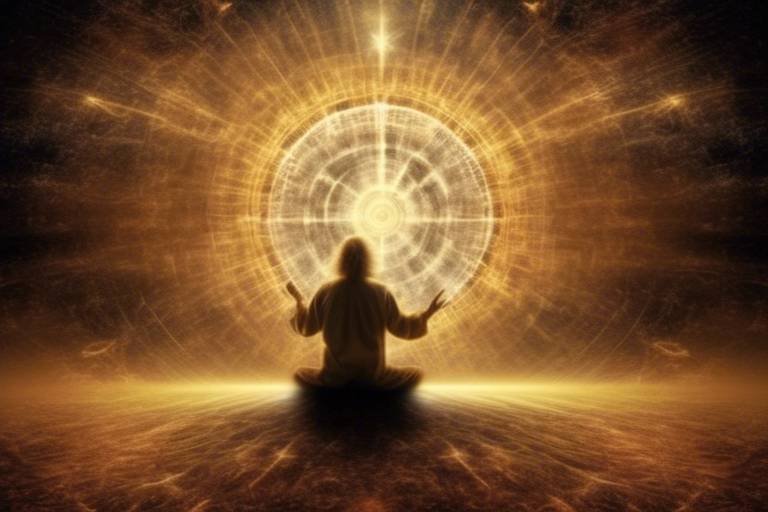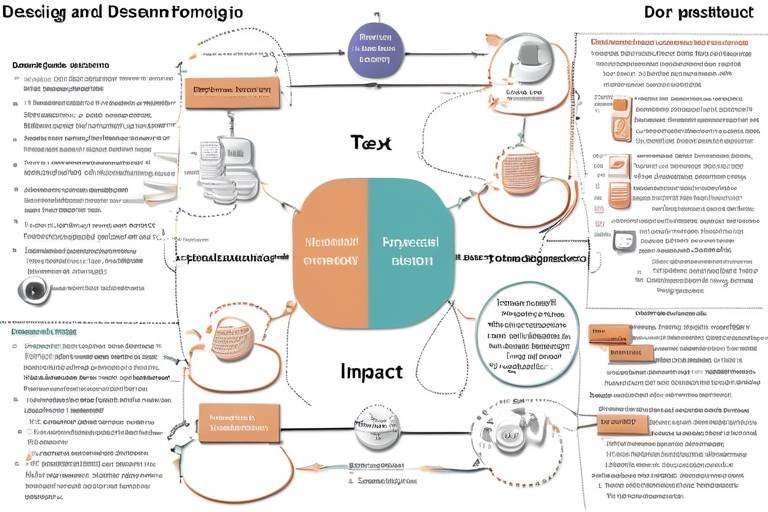Metaphysics - Decoding the Realm of Spirituality
Welcome to the fascinating world of metaphysics, where we embark on a journey to unravel the mysteries of existence and the universe. Have you ever pondered the profound questions of life, such as: What is real? What lies beyond our physical perception? These inquiries are at the heart of metaphysical exploration. Metaphysics is not just an abstract philosophical discipline; it is a lens through which we can view the spiritual dimensions of our lives. By understanding metaphysics, we can gain insights into our place in the cosmos and the nature of our being.
Imagine standing on the shore of an infinite ocean, where each wave represents a different philosophical thought about existence. As we dive deeper into this ocean, we discover that metaphysics provides the tools to navigate through the depths of reality. It invites us to question our assumptions and encourages an exploration of the unseen forces that shape our lives. In this article, we will explore the fundamental concepts of metaphysics, its connection to spirituality, and how these ideas can profoundly influence our understanding of existence.
Metaphysics asks the big questions that often leave us in awe. It delves into the nature of being, the essence of existence, and the vastness of the universe. As we peel back the layers of reality, we encounter ideas that challenge our perceptions and expand our consciousness. This exploration is not merely academic; it has practical implications for how we live our lives and engage with the world around us. By integrating metaphysical insights into our daily routines, we can foster a deeper connection to ourselves and the universe.
So, what exactly is metaphysics? At its core, it is a branch of philosophy that seeks to understand the fundamental nature of reality. It encompasses a wide range of topics, including substance, causality, and time. Each of these concepts plays a crucial role in shaping our understanding of both the physical and spiritual realms. As we explore these ideas, we will see how they intersect with various spiritual traditions and practices, highlighting the profound relationship between metaphysics and spirituality.
In essence, metaphysics serves as a bridge connecting the tangible world we experience with the intangible realms of thought and spirit. It invites us to explore the profound questions that have puzzled humanity for centuries, such as the nature of consciousness and the meaning of existence. By engaging with these ideas, we can cultivate a richer understanding of ourselves and our place in the universe, ultimately leading to a more fulfilling and enlightened life.
- What is the main focus of metaphysics? Metaphysics primarily focuses on understanding the fundamental nature of reality, including concepts like being, existence, and the universe.
- How does metaphysics relate to spirituality? Metaphysics and spirituality are intertwined, as both explore the nature of existence beyond the physical realm.
- Can metaphysical principles be applied in everyday life? Yes, metaphysical principles can significantly influence personal growth and spiritual development in our daily lives.

Understanding Metaphysics
Metaphysics is one of those intriguing branches of philosophy that dives deep into the fundamental nature of reality. Imagine standing on the edge of a vast ocean, where each wave represents a different question about existence. What is being? What does it mean to exist? How do we define the universe? These are the types of questions metaphysics seeks to answer, often leading us to a deeper understanding of ourselves and the world around us.
At its core, metaphysics is about exploration. It challenges us to look beyond the surface of what we can see, touch, or measure. Think of it as the ultimate detective work, where the clues are abstract concepts rather than physical evidence. For instance, when we ponder the idea of substance, we are not just asking what things are made of, but what it means for something to 'be' at all. This inquiry opens up a treasure chest of philosophical gems that help us navigate our understanding of existence.
One fascinating aspect of metaphysics is its relationship with time and space. These aren't just coordinates on a map; they are fundamental dimensions that shape our reality. Philosophers have debated for centuries whether time is linear or cyclical, and whether space is an empty container or a dynamic field of energy. Each perspective offers a unique lens through which we can view our lives and the universe.
To illustrate the complexity of metaphysical thought, let's consider a few key concepts:
- Ontology: This is the study of being and existence. It asks questions like "What entities exist?" and "What does it mean for something to exist?"
- Causality: This concept deals with cause and effect. It explores how events are connected and what it means for something to cause another.
- Identity: This involves understanding what makes an entity unique and how it remains the same over time despite changes.
Understanding these concepts is not just an academic exercise; it has profound implications for how we live our lives. When we start to grasp the essence of existence, we often find ourselves questioning our beliefs, values, and the very nature of our reality. It's like peeling back layers of an onion, revealing deeper truths that can shift our perspectives and enhance our spiritual journeys.
In summary, metaphysics is a gateway to exploring the most profound questions of existence. It encourages us to think critically and reflectively about our place in the universe. As we delve into these philosophical waters, we may discover not only the nature of reality but also the essence of our own being. So, are you ready to embark on this metaphysical adventure?

The Relationship Between Metaphysics and Spirituality
Metaphysics and spirituality are like two sides of the same coin, intricately woven together in the fabric of human understanding. While metaphysics seeks to answer profound questions about the nature of reality—what exists, what it means to exist, and the essence of the universe—spirituality dives deeper into the personal and experiential aspects of that existence. Have you ever pondered what lies beyond the physical world? That’s where the magic of metaphysics comes in, illuminating paths for spiritual exploration.
At its core, metaphysics provides a framework for understanding the unseen forces that govern our lives. It is not just about abstract theories; it’s about how these ideas shape our spiritual beliefs and practices. For instance, when we consider concepts like causality—the idea that every effect has a cause—we start to see how our actions resonate in the universe. This understanding can lead to a more profound sense of responsibility in our spiritual journeys. Spirituality often emphasizes personal growth and connection to something greater, and metaphysics lays the groundwork for these explorations.
Moreover, the intersection of metaphysics and spirituality invites us to ask questions that might seem daunting. What is the nature of the soul? Does it exist independently of the body? How do time and space influence our spiritual experiences? These questions are not just philosophical musings; they are gateways to deeper understanding. For example, many spiritual traditions teach that the soul transcends physical existence, a concept that resonates deeply with metaphysical ideas about the nature of being.
To illustrate this relationship further, let’s consider a few fundamental metaphysical principles and how they inform spiritual beliefs:
- Existence: The exploration of what it means to exist can lead to a spiritual awakening, prompting individuals to seek their purpose.
- Consciousness: Understanding consciousness as a fundamental aspect of reality can enhance spiritual practices like meditation and mindfulness.
- Unity: Many spiritual traditions emphasize the interconnectedness of all beings, a concept deeply rooted in metaphysical thought.
In essence, metaphysics acts as a lens through which we can view our spiritual beliefs more clearly. It encourages us to look beyond the surface and explore the deeper meanings of our existence. By integrating metaphysical insights into our spiritual practices, we can cultivate a more profound sense of awareness and connection to the universe. This journey is not merely intellectual; it is a transformative experience that can lead to greater peace, understanding, and fulfillment in our lives.
As we navigate through life, the relationship between metaphysics and spirituality can serve as a compass, guiding us toward a richer, more meaningful existence. By embracing both, we can unlock the mysteries of the universe and our place within it, ultimately leading us to a deeper understanding of ourselves and the world around us.
- What is the primary focus of metaphysics? Metaphysics primarily focuses on understanding the fundamental nature of reality, existence, and the universe.
- How does spirituality relate to metaphysics? Spirituality explores personal experiences and beliefs about existence, often informed by metaphysical principles.
- Can metaphysical concepts enhance spiritual practices? Yes, understanding metaphysical concepts can deepen one’s spiritual practices and awareness.

Key Metaphysical Concepts
When we dive into the ocean of metaphysical concepts, we encounter a treasure trove of ideas that challenge our understanding of reality. At its core, metaphysics is about asking the big questions—questions that often leave us scratching our heads. What is existence? What does it mean to be? And how do we define the universe around us? These are not just philosophical musings; they are the building blocks of our understanding of life and spirituality.
One of the key concepts in metaphysics is substance. This refers to what something is made of, its essential qualities that define its nature. Think of it like the ingredients in a cake. Without flour, sugar, and eggs, you wouldn't have a cake; similarly, without substance, there would be no existence. But it doesn't stop there. We also have the idea of essence, which is about what something truly is at its core. While substance is about the 'what', essence dives deeper into the 'why'. It's the difference between a person’s physical body and their personality or soul. This distinction helps us navigate our understanding of ourselves and others.
Another cornerstone of metaphysical thought is causality. This principle addresses the relationship between cause and effect. Have you ever wondered why things happen the way they do? Causality helps us make sense of the world by linking events together. For instance, if you plant a seed (cause), it grows into a tree (effect). Understanding causality not only enriches our perspective on life’s events but also informs our spiritual beliefs about how our actions (karma) influence our reality.
Then there's the concept of time. Time is a slippery concept that philosophers have debated for centuries. Is it linear, like a straight road, or cyclical, like the seasons? Different philosophical traditions offer varying interpretations of time. In some spiritual practices, time is viewed as an illusion, suggesting that past, present, and future coexist simultaneously. This perspective can profoundly impact how we approach our lives and our spiritual journeys.
Finally, we can't overlook the significance of space in metaphysical thought. Space is not just a physical dimension; it's also a realm where possibilities exist. The way we perceive space can affect our spiritual experiences and understanding of the universe. For instance, many spiritual practices emphasize the importance of creating a sacred space for meditation or reflection. This shows how metaphysical concepts are not just abstract ideas but have practical implications in our daily lives.
In summary, the realm of metaphysics is rich with concepts that encourage us to think deeply about our existence and the universe. By understanding substance, essence, causality, time, and space, we can gain insights that not only enhance our intellectual curiosity but also deepen our spiritual practices. As we continue to explore these ideas, we open ourselves to a broader understanding of reality and our place within it.
- What is metaphysics? Metaphysics is a branch of philosophy that explores the fundamental nature of reality, including concepts like being, existence, and the universe.
- How does metaphysics relate to spirituality? Metaphysics and spirituality are intertwined, as both examine existence beyond the physical realm and inform spiritual beliefs and practices.
- What are some key metaphysical concepts? Key concepts include substance, essence, causality, time, and space, each contributing to our understanding of reality and existence.
- Can metaphysical principles be applied in daily life? Yes! Metaphysical insights can enhance personal growth, mindfulness, and holistic health practices.

Substance and Essence
When we dive into the depths of metaphysics, the terms substance and essence often emerge as foundational concepts. But what do these terms really mean, and why should we care? Imagine substance as the material or the stuff that makes up everything in the universe. It’s like the clay from which a sculptor creates a masterpiece. On the other hand, essence is akin to the spirit or the identity of that masterpiece. It’s what makes a sculpture a sculpture and not just a lump of clay. Understanding the interplay between these two ideas can significantly enhance our comprehension of both ourselves and the universe.
Substance refers to the tangible, physical properties of objects. In philosophical terms, it’s what exists independently of our perceptions. Think of it as the foundation of reality. Everything we see, touch, and experience is made up of substances, whether they are solid, liquid, or gas. In contrast, essence is more abstract. It embodies the qualities and attributes that define what something is. For instance, the essence of a tree might include its ability to grow, produce oxygen, and provide shade, but these qualities are not the tree itself. They are what make it a tree, distinguishing it from other forms of life.
To illustrate this further, let’s consider a table. The substance of the table includes the wood, nails, and varnish that physically compose it. However, the essence of the table encompasses its function as a place to eat, work, or gather with friends. Without the substance, the essence cannot manifest, but without the essence, the substance lacks purpose. This relationship prompts us to ponder: what is the essence of our own lives? Are we merely the sum of our physical attributes, or is there a deeper essence that defines who we are?
In many philosophical discussions, the distinction between substance and essence raises questions about identity and change. If we think about ourselves, we might change physically over time—our bodies age, our appearances alter—but does our essence change? This inquiry leads us to explore concepts of the self, consciousness, and what it truly means to exist. Are we, in fact, the sum of our experiences and memories, or is there a deeper, unchanging essence that defines us?
As we engage with these concepts, it’s essential to recognize that different philosophical traditions may interpret substance and essence in various ways. For example, in Aristotelian philosophy, substance is seen as a combination of both matter and form, where matter represents the physical substance and form represents the essence. In contrast, some Eastern philosophies might emphasize a more fluid understanding of essence, suggesting that everything is interconnected and ever-changing.
Ultimately, grappling with the ideas of substance and essence encourages us to reflect on our own lives. It invites us to ask ourselves profound questions: What constitutes our essence? How do our experiences shape us, and what remains constant amidst the changes? By exploring these concepts, we can gain deeper insights into our existence and the universe around us.

Time and Space in Metaphysical Thought
When we dive into the realm of metaphysics, one cannot help but be captivated by the intricate dance of time and space. These two concepts are not merely the backdrop of our physical existence; they are the very fabric that weaves together our understanding of reality itself. In metaphysical thought, time is often perceived not as a linear progression from past to future, but as a more complex and multifaceted phenomenon. Imagine time as a vast ocean, with waves representing moments that can ebb and flow, sometimes crashing into the present, while at other times, retreating into the depths of memory or anticipation.
Similarly, space is not just an empty void waiting to be filled; it is a dynamic and vibrant entity that interacts with everything within it. In metaphysics, space is often seen as a container of potentiality, where every point holds the possibility of existence. This perspective invites us to ponder questions like, "What does it mean to occupy a space?" and "How does the essence of a place influence our experiences?"
Philosophers have long debated the nature of time and space, leading to various interpretations that shape our spiritual beliefs. For instance, some traditions propose that time is cyclical, echoing the rhythms of nature, while others view it as a straight line, emphasizing progress and evolution. These differing views can significantly impact our spiritual practices. In a cyclical view, rituals may focus on renewal and the interconnectedness of life, while a linear perspective might inspire a quest for personal growth and achievement.
To illustrate these concepts further, let’s consider how different philosophical schools approach time and space:
| Philosophical School | View on Time | View on Space |
|---|---|---|
| Aristotelian | Linear and measurable | Static and absolute |
| Platonic | Timeless Forms | Idealized and abstract |
| Eastern Philosophies | Cyclical and eternal | Interconnected and dynamic |
As we navigate through these metaphysical waters, it becomes clear that our understanding of time and space is deeply intertwined with our spiritual journeys. For example, many mindfulness practices emphasize being present in the moment, which aligns with the idea of a fluid, ever-changing time. This awareness can lead to a profound sense of peace and connection to the universe.
Moreover, our perception of space can enhance our spiritual practices. Creating sacred spaces in our homes or engaging with nature can transform our experiences, allowing us to feel more grounded and connected to something greater than ourselves. The way we perceive and interact with time and space can ultimately shape our spiritual paths, guiding us toward deeper insights and understanding.
In conclusion, the metaphysical exploration of time and space opens up a realm of possibilities for spiritual growth and understanding. By contemplating these concepts, we can gain a richer perspective on our existence and the universe around us.
- What is the difference between time and space in metaphysical thought? Time is often seen as a progression or cycle of moments, while space is viewed as a dynamic entity that influences our experiences.
- How do different cultures interpret time and space? Various cultures have unique perspectives; for example, Eastern philosophies often view time as cyclical, whereas Western traditions may see it as linear.
- Can understanding metaphysical concepts improve mindfulness? Yes, by grasping the nature of time and space, individuals can enhance their mindfulness practices and cultivate a deeper awareness of the present moment.

Metaphysics in Different Cultures
Metaphysics is not a one-size-fits-all concept; rather, it varies widely across different cultures, each bringing its own unique perspective to the table. This diversity enriches our understanding of existence and spirituality, revealing how various traditions interpret the fundamental nature of reality. For instance, in Eastern philosophies like Buddhism and Hinduism, metaphysical principles often intertwine with spiritual practices, emphasizing concepts like karma and reincarnation. These ideas suggest that our actions in this life have profound implications for our future existences, weaving a tapestry of interconnectedness that transcends the physical realm.
In contrast, Western metaphysical thought, particularly in the realms of Platonism and Aristotelianism, often leans towards a more dualistic interpretation of reality. Here, the distinction between the material and immaterial worlds is emphasized, with a focus on the existence of abstract entities like forms or ideas. This philosophical approach influences various religious doctrines, such as Christianity, which posits a clear separation between the divine and the earthly, shaping a metaphysical framework that informs spiritual beliefs and practices.
Furthermore, Indigenous cultures often possess rich metaphysical traditions that are deeply rooted in their connection to nature and the cosmos. For example, many Native American tribes view the universe as a living entity, where everything is interrelated and imbued with spiritual significance. This holistic perspective fosters a sense of responsibility towards the environment and emphasizes the importance of rituals that honor the interconnectedness of all beings.
To better illustrate the differences in metaphysical thought across cultures, consider the following table:
| Culture | Metaphysical Concepts | Spiritual Practices |
|---|---|---|
| Eastern (Buddhism, Hinduism) | Karma, Reincarnation, Oneness | Meditation, Ritual Offerings |
| Western (Platonism, Christianity) | Dualism, Abstract Forms | Prayer, Sacraments |
| Indigenous Cultures | Interconnectedness, Nature Spirits | Rituals, Nature Worship |
As we explore these varied metaphysical frameworks, it's essential to recognize that each culture's understanding of reality shapes its spiritual practices and beliefs. This interplay between metaphysics and spirituality not only reflects the values and experiences of a culture but also provides a rich tapestry of insights that can enhance our own spiritual journeys. By embracing these diverse perspectives, we can cultivate a more profound appreciation for the mysteries of existence and our place within the universe.
- What is metaphysics? Metaphysics is a branch of philosophy that explores the fundamental nature of reality, including concepts like being, existence, and the universe.
- How does metaphysics relate to spirituality? Metaphysics and spirituality are intertwined as both seek to understand existence beyond the physical realm, influencing beliefs and practices.
- Why is understanding different cultures' metaphysical views important? Different cultures offer unique perspectives on reality, enriching our understanding of existence and enhancing our spiritual practices.

Practical Applications of Metaphysics
Metaphysics isn't just some abstract philosophical concept that lives in dusty old books; it's a vibrant field that can profoundly impact our everyday lives. Think of it as the blueprint for understanding the universe and our place within it. By applying metaphysical principles, we can unlock deeper insights into our existence, enhance our spiritual practices, and even improve our mental well-being. It's like having a secret key that opens doors to personal growth and enlightenment.
One of the most significant applications of metaphysics is in the realm of personal development. By understanding the nature of reality and our connection to it, we can shift our perspectives and attitudes. For instance, the metaphysical concept of interconnectedness emphasizes that everything in the universe is linked. This realization can foster compassion and empathy, encouraging us to treat others—and ourselves—with greater kindness. Imagine walking through life with the awareness that your actions ripple through the cosmos, affecting not just your own life but the lives of others. It's a powerful motivator to act with intention.
Moreover, metaphysical principles can significantly enhance our mindfulness practices. When we dive into the essence of being present—truly savoring each moment—we tap into a deeper understanding of time and existence. Mindfulness, rooted in the awareness of our thoughts and feelings, aligns beautifully with metaphysical insights. For example, consider the idea that time is not a linear path but rather a vast, interconnected tapestry. This perspective can help us let go of past regrets and future anxieties, allowing us to fully immerse ourselves in the now. As we practice mindfulness through meditation or simply by being aware of our surroundings, we cultivate a state of being that resonates with our true essence.
In addition to mindfulness, metaphysics plays a crucial role in various healing practices. Many holistic approaches incorporate metaphysical principles, recognizing that our physical health is intertwined with our spiritual and emotional well-being. For instance, energy healing modalities like Reiki or crystal healing are grounded in the belief that everything has an underlying energy that can be manipulated for healing purposes. This understanding allows practitioners to address not just the symptoms of illness but the root causes, promoting a more profound sense of healing. Imagine visiting a healer who, instead of just treating your symptoms, helps you explore the deeper spiritual issues at play. This is where metaphysics shines, guiding us toward a more comprehensive approach to health.
Furthermore, integrating metaphysical insights into our daily lives can lead to a more fulfilling existence. Here are a few practical ways to do just that:
- Set Intentions: Begin each day by setting a clear intention. This practice aligns your actions with your deeper purpose.
- Reflect on Interconnectedness: Take moments throughout the day to remind yourself of your connection to others and the universe.
- Explore Your Beliefs: Regularly examine your beliefs about reality, existence, and your place in the world. This self-inquiry can lead to profound insights.
By weaving these metaphysical practices into the fabric of our lives, we can cultivate a richer, more meaningful experience. It's like adding vibrant colors to a black-and-white canvas, transforming our perception of reality and allowing us to live more authentically.
- What is metaphysics? Metaphysics is a branch of philosophy that explores the fundamental nature of reality, including concepts such as being, existence, and the universe.
- How does metaphysics relate to spirituality? Metaphysics and spirituality are interconnected, as both seek to understand existence beyond the physical realm.
- Can metaphysical principles be applied in everyday life? Yes! Metaphysical principles can enhance personal growth, mindfulness, and holistic health practices.
- What are some examples of metaphysical practices? Examples include mindfulness meditation, energy healing, and setting intentions for personal development.

Metaphysics and Mindfulness
When we think about mindfulness, we often envision a serene moment of meditation, a quiet space where we can tune into our thoughts and feelings. But what if I told you that the roots of mindfulness are deeply intertwined with metaphysical concepts? Yes, that's right! The practice of being present and aware is more than just a mental exercise; it’s a profound exploration of our existence and reality.
At its core, mindfulness encourages us to embrace the present moment, shedding the weight of past regrets and future anxieties. This aligns beautifully with metaphysical principles, which urge us to question the nature of existence and our place within it. Think of it as peeling back the layers of an onion; each layer reveals deeper truths about who we are and how we relate to the universe around us.
One of the key metaphysical ideas that enhances mindfulness is the concept of interconnectedness. In many metaphysical frameworks, everything in the universe is seen as connected. This means that your thoughts, feelings, and actions are not isolated; they ripple through the fabric of reality. When practicing mindfulness, acknowledging this interconnectedness can transform your experience. You realize that your moment of awareness is not just about you; it’s a part of a larger tapestry of existence.
Moreover, metaphysics encourages us to explore the nature of consciousness. What does it mean to be aware? How does our perception shape our reality? By diving into these questions, mindfulness becomes a gateway to deeper spiritual insights. When you sit in silence, observing your thoughts, you begin to understand that your mind is a vessel for greater truths. Each thought can be seen as a reflection of the universe itself, echoing the belief that we are all part of a greater whole.
To help illustrate this connection, let’s consider a few practical ways metaphysical principles can enhance your mindfulness practice:
- Awareness of Presence: Recognizing that the present moment is the only reality we truly experience.
- Non-attachment: Understanding that thoughts and feelings are transient, much like clouds passing through the sky.
- Unity with the Universe: Realizing that your breath connects you to all living things, fostering a sense of belonging.
Incorporating these metaphysical insights into your mindfulness practice not only enriches your experience but also deepens your spiritual journey. Imagine sitting in meditation, feeling the air fill your lungs, and knowing that each breath is a connection to the cosmos. It’s a powerful realization that can transform a simple mindfulness exercise into a profound exploration of existence.
As you cultivate mindfulness, remember that you are engaging in a dialogue with the universe. Each moment of awareness opens the door to understanding not just who you are, but also the very fabric of reality itself. So, the next time you sit in silence, take a moment to reflect on the metaphysical underpinnings of your practice. How do these concepts shape your understanding of existence? Your journey into mindfulness is also a journey into the depths of metaphysical thought, where every moment becomes an opportunity for profound discovery.
- What is the connection between metaphysics and mindfulness? Metaphysics explores the nature of reality, while mindfulness encourages us to be present in that reality. Together, they deepen our understanding of existence.
- How can I incorporate metaphysical concepts into my mindfulness practice? Reflect on ideas like interconnectedness and the transient nature of thoughts during your mindfulness sessions to enrich your experience.
- Why is understanding consciousness important in mindfulness? Understanding consciousness helps us realize that our thoughts are part of a larger reality, enhancing our awareness and presence.

Metaphysical Healing Practices
When we talk about , we're diving into a fascinating realm where the mind, body, and spirit converge to promote well-being. These practices stem from the belief that our physical ailments are often manifestations of deeper, unresolved emotional or spiritual issues. It’s like peeling an onion; each layer reveals something more profound about our existence and health. By addressing these underlying causes, metaphysical healing aims to restore balance and harmony within ourselves.
One of the most popular metaphysical healing practices is energy healing. This approach operates on the premise that everything in the universe, including our bodies, is composed of energy. Techniques such as Reiki, Qi Gong, and Therapeutic Touch channel healing energy to remove blockages and promote the free flow of energy within the body. Imagine your body as a river; when the water flows freely, all is well, but when there are obstructions, the water stagnates, leading to problems. Energy healing helps to clear those obstructions, allowing the river of energy to flow smoothly again.
Another significant aspect of metaphysical healing is crystal healing. Crystals are believed to carry specific vibrations and energies that can influence our own energy fields. Practitioners use various crystals to target different issues, whether it's anxiety, physical pain, or emotional turmoil. For instance, amethyst is often used for its calming properties, while rose quartz is associated with love and emotional healing. The idea is that by surrounding ourselves with these stones, we can absorb their positive energies and promote healing. Think of crystals as little batteries, recharging our spiritual and emotional states.
Moreover, meditation plays a crucial role in metaphysical healing. Through meditation, individuals can connect with their inner selves, gain clarity on their emotional struggles, and foster a sense of peace. It’s a practice that not only calms the mind but also opens up pathways for spiritual growth. Many meditation techniques incorporate visualization, where one imagines healing light enveloping the body, promoting a profound sense of wellness. This practice is akin to tuning a musical instrument; it helps align our inner frequencies, creating harmony and balance.
In addition, affirmations are a powerful tool within metaphysical healing. By repeating positive statements, individuals can reshape their thoughts and beliefs, ultimately influencing their physical health. For example, affirming “I am healthy and whole” can shift one’s mindset and promote healing. It’s like planting seeds in a garden; with care and attention, those seeds can grow into a flourishing reality. This practice emphasizes the connection between our thoughts and our physical state, reinforcing the idea that our mental and emotional well-being directly impacts our health.
Lastly, it’s essential to recognize the role of intention in metaphysical healing. The belief is that setting a clear intention for healing can amplify the effects of any practice. Whether it’s during a healing session, meditation, or even while using crystals, having a focused intention directs the energy toward the desired outcome. It’s similar to aiming a flashlight in the dark; the light becomes powerful and effective when directed purposefully.
In conclusion, metaphysical healing practices offer a unique approach to health and wellness that transcends traditional methods. By focusing on the interconnectedness of mind, body, and spirit, these practices encourage holistic healing and personal growth. They invite us to explore the deeper layers of our existence and to embrace the idea that true healing often starts from within.
- What is metaphysical healing? Metaphysical healing refers to practices that address the emotional and spiritual aspects of health, aiming to restore balance and harmony in one's life.
- How does energy healing work? Energy healing techniques channel healing energy to remove blockages and promote the free flow of energy within the body.
- Can crystals really heal? Many believe that crystals carry specific vibrations that can influence our energy fields and promote healing.
- What role does meditation play in healing? Meditation helps individuals connect with their inner selves, gain clarity, and foster a sense of peace, which can aid in healing.
- How do affirmations contribute to healing? Affirmations reshape thoughts and beliefs, influencing physical health and promoting a positive mindset.
Frequently Asked Questions
- What is metaphysics?
Metaphysics is a branch of philosophy that investigates the fundamental nature of reality. It dives deep into concepts like being, existence, and the universe, seeking to answer profound questions about what is truly real beyond our physical experiences.
- How is metaphysics related to spirituality?
Metaphysics and spirituality are closely linked. Both explore the nature of existence beyond the tangible world. While metaphysics provides frameworks and principles, spirituality often applies these insights to personal beliefs and practices, guiding individuals in their quest for meaning.
- What are some key metaphysical concepts?
Some essential metaphysical concepts include substance, causality, and time. Understanding these ideas can help individuals grasp deeper spiritual themes and questions, enriching their overall comprehension of existence and reality.
- What is the difference between substance and essence?
The distinction between substance and essence is crucial in metaphysics. Substance refers to what something is made of, while essence is about what something fundamentally is. This differentiation helps us understand our own identity and the nature of the universe.
- How do time and space factor into metaphysical thought?
Time and space are central to metaphysical inquiry. Different philosophical perspectives offer unique insights into these concepts, which can significantly impact our understanding of spirituality and our place in the universe.
- How do various cultures interpret metaphysical concepts?
Different cultures have distinct metaphysical frameworks that shape their spiritual beliefs. By exploring these interpretations, we can appreciate the rich diversity of spiritual practices and understand how metaphysical ideas influence them.
- Can metaphysical principles be applied in daily life?
Absolutely! Metaphysical principles can be integrated into everyday life, enhancing personal growth and spiritual development. By applying these insights, individuals can cultivate a deeper understanding of themselves and their connections to the universe.
- What role does mindfulness play in metaphysics?
Mindfulness practices often draw upon metaphysical ideas. By understanding these concepts, individuals can enhance their mindfulness and spiritual awareness, allowing for a more profound engagement with the present moment.
- Are there healing practices that incorporate metaphysics?
Yes! Many healing practices incorporate metaphysical principles, exploring the spiritual dimensions of health. These holistic approaches often aim to align the mind, body, and spirit, promoting overall well-being and personal transformation.



















